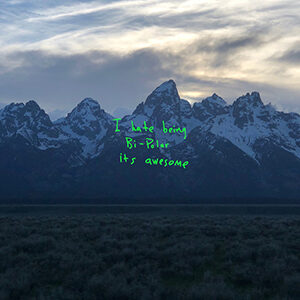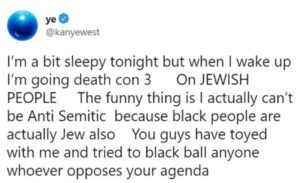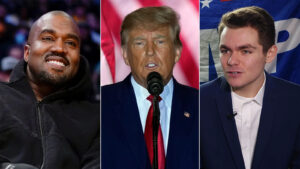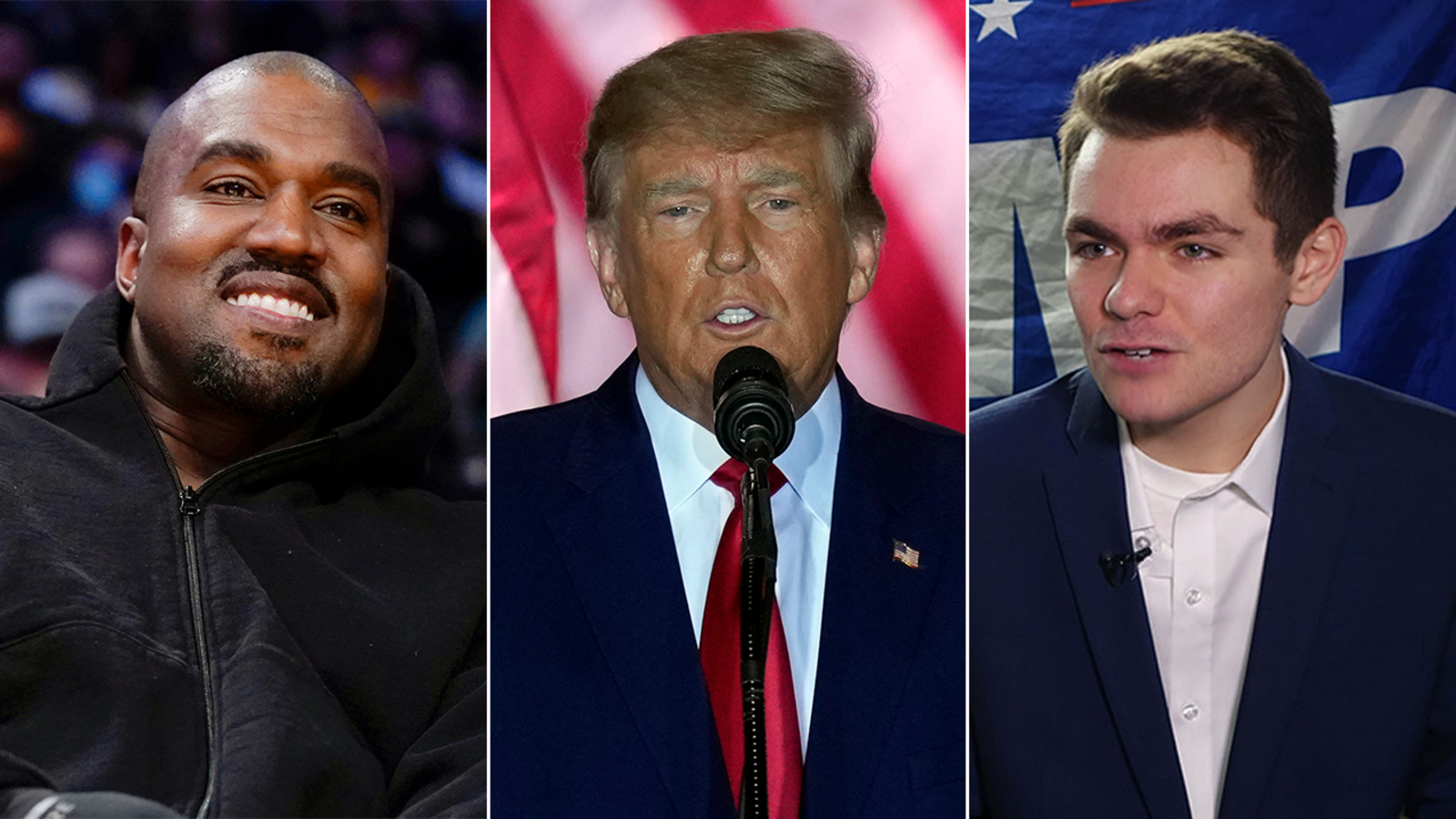What does it mean to separate art from an artist? What circumstances make humans more inclined to forgive what could be considered unforgivable mistakes? What designates “the last straw” when it comes to cancel-culture?

photo courtesy of Wikipedia
From his 2010 album My Beautiful Dark Twisted Fantasy, to his 2018 album Ye with the words, “I hate being bipolar it’s awesome” on the cover, it’s easy to assume that Ye (formerly known as Kanye West) deals with his own personal issues surrounding mental health. He has a history of using his art to illustrate the complexities of bipolar disorder and other mental illnesses. He also has a reputation for posting controversial and offensive comments about a variety of topics, all of which were generally forgiven by social media platforms and the public up until now. On October 8, 2022, Ye posted an antisemitic tweet that appeared to be the final straw for many of his fans.

photo courtesy of ADL
Through the entire month of October, Ye made several antisemitic comments on a variety of platforms. He has further spread harmful stereotypes about Jews and insinuated that they were controlling other groups and organizations. While Ye has committed no physical crime, he has tens of millions of followers, some of which have acted on these sentiments.
According to the Anti-Defamation League (ADL), “known extremists and antisemites have embraced Ye’s recent statements, leveraging his comments to further their own agendas.” Ye’s “immense influence” makes his harmful words significantly more worrying to Jewish communities across the country.
In the week prior to Ye’s publication of this hateful tweet, he made several other controversial statements and posts. On October 3, Ye attended Paris Fashion Week wearing a shirt with the words “White Lives Matter” across the back, in the same font as the traditional Black Lives Matter logo. On October 7, Ye posted on Instagram and insinuated that Sean Combs, or popular rapper Diddy, was under the control of Jews. After Instagram restricted Ye’s account following these events, he went to Twitter and published his October 8 antisemitic tweet.
Additionally, on November 22, Ye had dinner with Donald Trump and Nick Fuentes, an antisemitic and white supremacist American commentator, who is a Holocaust denier. Trump and Ye’s mass influence means that their choice to dine with Fuentes puts more weight to his words, causing Jews from both sides of the political spectrum to fear what may come next.

photo courtesy of ABC7 SF
Ye later continued his antisemitic hate speech, praising Adolf Hitler during an interview with Alex Jones on December 1. “I like Hitler,” he said. “I love Jewish people, but I also love Nazis.”
He then posted an image of a swastika on his Twitter account, resulting in his ban from Twitter. Elon Musk, CEO of Twitter, defended his decision to ban the rapper by highlighting the detrimental effects and reactions to Ye’s words from all political parties. “You know Twitter is being fair when extremists on the far right and far left are simultaneously upset,” he said.
Ye previously had a partnership with Adidas, a company that has its own troublesome and antisemitic past. German brothers Adolf and Rudolf Dassler started the company in 1924 in Germany, and both were members of the Nazi party. During World War II, the Dasslers converted their factory to be used to build the Panzerschreck, a weapon they planned to use against the Allied powers. The company’s involvement in the war was hidden, and Adidas continued to become popular among Americans.
While Adidas recently discontinued their partnership with Ye, the corporation has played a large role in this developing story, especially given that Ye’s controversial and offensive remarks are not the first of their kind. In the past, Ye has posted many other hateful and derogatory comments to his social media accounts and other platforms. Historically, many of his fans have forgiven these offenses, using Ye’s mental illnesses to deflect responsibility and blame.
Sam Birtwistle ’24 is a student at Lick-Wilmerding High School who identifies as Jewish. “I think there are undertones of dangerous and villainous action, that make him out to be a monster of a person when in reality, this is mental illness,” Birtwistle said on November 18, before Ye met with Trump and Fuentes and expressed his appreciation for Hitler. “I don’t believe that this absolves any of his hateful comments in any way, shape or form, but I don’t think calling Kanye evil is necessarily correct.”
According to the Recovery Village, Ye was diagnosed with bipolar disorder in 2016, a mental illness in which individuals endure severe mood swings, mania and depression. According to the Mayo Clinic, these mood swings can affect one’s “judgment, behavior and the ability to think clearly.”
According to LWHS Counselor Erika Solis, “[individuals with bipolar disorder] might act impulsively, might be paranoid, might be grandiose during a manic episode. They make statements that they wouldn’t otherwise make.”
USA Today published an article about Ye’s antisemitic statements on October 11, headlined “Kanye West bipolar disorder is not excuse for antisemitism.” The Washington Post has a more moderate take on the matter, having published an article on the same day headlined “What does bipolar disorder feel like? Can it explain Kanye’s behavior?”
So do mental illnesses absolve him of responsibility for his actions? To what extent?
“It’s nuanced, but it seems like he has had public incidents during manic episodes in the past and has gotten feedback on the impact of those. You do bear responsibility after a certain point for the impact of your words and actions,” said Solis.
Another factor to take into account is the role of social media. Platforms such as Instagram and Twitter have exponentially increased the speed of mass communication since their invention, making it easy for influential figures to spread information.
LWHS Counselor Yuka Hachiuma noted that this spread of information might even be too easy. “Social media accelerates everything. There’s a much quicker spread of information, which can be great, but in a situation like this I think things really need to be slowed down. For example, if Ye wanted to articulate these feelings several years ago, his methods would be different. And he would likely be more vetted before making that statement, and have time to be thoughtful about it,” Hachiuma said.
On the flip side, it also means that the public’s decision to “cancel” Ye was quite fast. Cancel culture as a whole can leave less space for empathy.
“I think people forget that there’s a human under there and that what he really needs is help. I don’t think that excuses anything he has said, but I think the way to hopefully resolve this is to get him help,” Carolina Fox ’24, another Jewish student at LWHS, said on November 18th.
In addition to the harm caused directly by Ye’s comments, this tweet also influenced an increase in antisemitic events across the country in the following weeks. Demonstrators in Los Angeles were witnessed holding signs above the 405 freeway that read, “Kanye is right about the Jews’’ on October 19th.
According to Manu Rapaport ’25, co-leader of the Jewish Student Union (JSU) at LWHS, Ye’s comments have left a tangible impact on communities he is a part of in the Bay Area. “It made my synagogue afraid. We never know when the next antisemitic incident will happen, and [Ye’s tweet] has just made the probability higher,” he said. Some local synagogues have chosen to increase security as well.
To Rapaport, the mass reprimanding of Ye for this incident was a pleasant surprise. “I think Kanye’s antisemetic comment was really easy to condemn because it was very blatant and outright. It was hard to ignore,” he said.
He also mentioned a potential negative side of this as well: “my worry is that what Kanye said will make people think that is what anti-semitism normally is. And normally it’s a lot more invisible.”
In response to Ye’s tweet, JSU held a discussion space about anti-semitism for the Jewish community at LWHS. Rapaport mentioned that their goal as a club is to be a safe space for students to come together, celebrate their heritage and debrief incidents such as this one.
This situation brings up the question of whether or not it is okay to separate art from the artist. Is it okay to continue listening to Ye’s music through all of this?
Hachiuma does not continue to support Ye. “To me, it’s because of the cumulative effect,” she said regarding Ye’s history of making harmful statements to the public. “It also has to do with where we are as a country, and it doesn’t feel safe to let [Ye’s comments] slide, because who knows what could happen as a result,” she said.
Solis elaborated on this sentiment. “Generally, I feel like I’m supporting the artist if I continue consuming their art. If someone is putting out messages that I think are harmful, I don’t feel good continuing to support them. That’s just where it lands with my personal ethics,” she said.
Sebastian Galleno ’25 has his own reasoning for continuing to listen to Ye’s music, making a different choice for himself as an individual. “Listening to his music does not show that I support Kanye, because I don’t support him or his views. It’s more that I enjoy listening to his music because it makes me feel happy, and I think his songs are good,” he said on November 18.
Rapaport noted that Jewish principles generally promote empathy and oppose cancel culture. “A lot of Judaism’s [principles are] about arguing with people’s stances, and not the person. The way we argue with others should not get in the way of how we respect people, their work and art. However, if I saw someone listening to Kanye’s music it would make me feel uncomfortable with what views that person may have,” he said.
Although Ye has faced repercussions for his posts, such as bans on social media accounts, his large presence on multiple platforms has permitted him to continue spreading antisemitic messages to the public. Consequently, many fans continue to change their opinions on the rapper and their feelings towards continuing to listen to his music as he broadcasts more posts.
Both Birtwistle and Fox expressed additional opinions on the matter in a follow up interview after Ye’s dinner with Trump and Fuentes and his posts about Hitler.
“I’ve genuinely just stopped listening to Kanye not because I think his music is bad, but because I think that his legacy and his voice is something that I have no place standing by,” Birtwistle said.
“I used to be a really big fan of Kanye’s music, but after the recent news, I can’t support him anymore.” Fox said.
Former and current fans of Ye’s music have made a wide range of decisions about their response to Ye’s tweet and the public response that followed, doing what feels right to them. Solis articulated how there is no singular answer to the question of whether it is ok to separate art from the artist, saying, “I do think it’s a very individual choice that each person has to make. Everyone has to decide, ‘where is the line for me?’”







промокод 1x. Click Here:👉 https://www.medtronik.ru/images/pages/bonus_kod_na_1xbet_pri_registracii_6500_rubley.html
купоны мелбет Click Here:👉 http://lynks.ru/geshi/php/?melbet_promokod_pri_registracii_2020.html
Experience the full power of an AI content generator that delivers premium results in seconds. 100% uniqueness,7-day free trial of Pro Plan, No credit card required:). Click Here:👉 https://bit.ly/3Py2Iv6